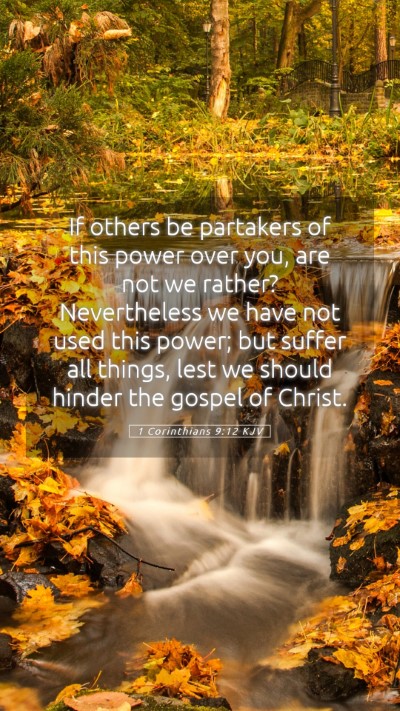Understanding 1 Corinthians 9:12
1 Corinthians 9:12 states:
"If others be partakers of this power over you, are not we rather? Nevertheless we have not used this power; but suffer all things, lest we should hinder the gospel of Christ."
This verse offers rich insights into the Apostle Paul's approach to ministry, self-denial, and the priority of the Gospel. Below is a combined summary of the verse's meaning drawn from respected public domain commentaries.
Bible Verse Meaning
The Apostle Paul, in this verse, addresses the right he holds as an apostle to receive support and benefits from those to whom he ministers. Matthew Henry emphasizes that Paul is asserting the legitimacy of receiving material support for spiritual work. However, Paul chooses not to assert this right for the sake of the Gospel, showing his commitment to its advancement above personal gain.
Albert Barnes explains that Paul understood the potential for his rights to be seen as an obstacle to the Gospel. By foregoing these rights, he exemplifies a selfless attitude that prioritizes the promotion of Christ's message. His renunciation of personal benefits illustrates the principle of sacrificing personal pleasures for the greater good of the faith community.
Adam Clarke adds that the social context of the early church may have created circumstances where leaders could claim support based on their authority. However, Paul refrains from this for he is aware that even the valid exercise of rights can lead to misunderstandings or conflict among believers. His approach encourages unity and goodwill among the followers of Christ.
Key Themes and Insights
- Self-Denial in Service: Paul’s choice to abstain from financial support reflects a fundamental principle of Christian service that prioritizes the needs and beliefs of others over one’s own rights.
- Precedence of the Gospel: Paul's commitment to not hindering the gospel manifests a deep understanding of its importance, indicating that personal rights should not obstruct its spread.
- Authority vs. Humility: While acknowledging his authority, Paul demonstrates humility by not using that authority for personal gain, setting an example for church leaders.
- Community and Conflict Resolution: This verse speaks to the larger theme of maintaining unity within the church and avoiding actions that could lead to discord among believers.
Application of 1 Corinthians 9:12
This verse emphasizes the importance of understanding Scripture and applying its teachings in our own lives. Here are some practical applications:
- Being willing to forego personal rights for the sake of others, especially in a church context.
- Prioritizing collective spiritual growth over individual desires.
- Reflecting on how one's actions influence the perception of the Gospel in the community.
- Encouraging dialogue in Bible study groups about the tensions between authority and service in Christian ministry.
Cross References
This verse relates to several other passages in the Bible that echo similar themes:
- 2 Corinthians 11:8-9: Paul's discussion of support while being careful not to burden the churches.
- 1 Thessalonians 2:6-9: Paul's example of working hard and not being a financial burden to the believers.
- Galatians 6:14: The principle of boasting only in the cross and the emphasis on spiritual over material gain.
Conclusion
1 Corinthians 9:12 offers significant Bible verse commentary on how the Apostle Paul navigated his rights as an apostle. By prioritizing the needs of the community and the advancement of the Gospel, he provides a model for believers on how to approach personal rights and responsibilities within the faith. This text encourages readers to engage in Bible study lessons that challenge them to reflect on how they live out their faith in relation to others.


